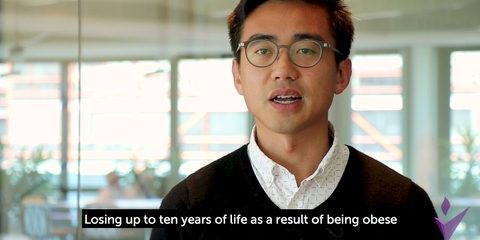
Being overweight or obese in your 20's will take years off your life, according to a new report
Young adults classified as obese in Australia can expect to lose up to 10 years in life expectancy, according to a major new study.
New modelling from The George Institute for Global Health and the University of Sydney also predicts that 36.3 million years of life will be lost over the lifetime of today’s Australian adult population as a result of overweight and obesity – with men standing to lose on average 27% more years of life than women.
Lead author Dr Thomas Lung, from The George Institute for Global Health, said the most alarming findings published in the International Journal of Obesity affected people in their 20s and 30s.
“We know that excess weight has an impact on your health, but to have excess weight as a young adult is really significant on life expectancy. We are talking about losing up to 10 years of your life,” said Dr Lung.
The model used by the researchers calculates the expected amount of weight that adults put on every year depending on their age, sex and current weight. It also takes into account current life expectancy in Australia and higher mortality of people with excess weight.
The model predicted remaining life expectancy for people in their 20s, 30s, 40, 50s and 60s in healthy, overweight, obese and severely obese weight categories. It also calculated the number of years lost over the lifetime for people with excess weight in each age group, compared to those with a healthy weight.
The researchers said the findings released on World Obesity Day were relevant to other high-income countries.
Key findings:
- On average, healthy weight men and women in their 20s can expect to live another 57 and 60 years, respectively. But, if they are already in an obese weight category in early adulthood, women will lose 6 of these years and men will lose 8. If they are in a severely obese weight category, women will lose 8 years and men will lose 10.
- The risks of early death associated with excess weight were apparent at every age group but decreased with age. Obese women in their 40s will experience a reduction of 4.1 years, whilst obese men stand to lose 5.1 years. For individuals in their 60s, this reduction in life expectancy is estimated at 2.3 years for women and 2.7 years for men.
- These gender disparities mean that men in their 20s in Australia today will stand to lose 5.6 million years of life as a result of excess weight over the course of their lifetime, compared to 3 million for women in the same age bracket.
Co-author Associate Professor Alison Hayes, from the School of Public Health at The University of Sydney, said the findings highlight the urgent need for interventions to prevent young people becoming overweight or obese in their 20s and 30s.
There has been a threefold increase in the prevalence of severe obesity in young adults since 1995.
A/Prof Hayes said: “There is the assumption that overweight and obesity is a problem for people in middle age, and that people in their 20s and 30s are in the prime of their lives. Yet currently, only 43% of Australian men in their 20s and 34% in their 30s are in a healthy weight range, which is worrying.”
Dr Lung concludes, “Our model predicts adult obesity prevalence will increase to 35% by 2025. We need to act now and have an obesity prevention strategy targeting adults at all ages and in particular young adults.”
The George Institute recently provided a submission to the Senate Select Committee into the Obesity Epidemic in Australia where it fully endorsed the Tipping the Scales report produced by the Obesity Policy Coalition. The report, with support from over 35 organisations, makes a number of recommendations to tackle the obesity crisis including making the Health Star Rating system mandatory, developing a national active travel strategy to promote walking, cycling and use of public transport and establishing obesity prevention as a national priority with a national taskforce.




